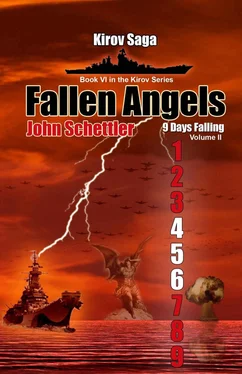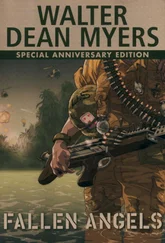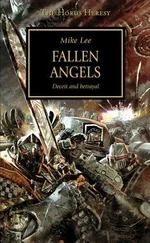Even as he said that Fedorov revisited his feeling that the encounter with Mironov at Ilanskiy was fated. Things had played out in a haphazard way. Yes, Troyak was correct to point that out. We could just as easily be sitting over there aboard Anatoly Alexandrov now, and would not have had to trek over a thousand miles to make this rendezvous. But then I would not have found that rift in time on the stairwell at Ilanskiy. I would not have met with Mironov, with Sergei Mironovich Kostrikov—Kirov!
Troyak was listening, still smiling, and already mounting his ear buds to use the radio set woven into the fabric of his service jacket. “Shall we give them a call to let them know we are here?”
Fedorov considered that, then looked around for any sign of a small boat or life raft. He spied a weathered dinghy on the aft deck and pointed. “We’ll need that,” he said quickly. “I don’t think it would be wise if the hovercraft come steaming up to these ships. We’ll get off in that boat and head out to sea. They can pick us up there, without so many eyes to bulge.”
“Very well, sir. Troyak nodded at Zykov, who immediately set off to secure the boat. A boatswain protested, but quickly silenced himself when Fedorov and Troyak came striding up. Fedorov decided to cover their tracks a bit.
“This is far too dangerous,” he said to the boatswain. “Did you see those German planes? Did you see the Katyushas hit them? Amazing! We’re going ashore now, so get out of the way.”
The man gave way, unwilling to challenge a colonel in the NKVD, but as they got the dinghy up on the winch and began lowering it, a few sailors whistled at them in rebuke.
“Looks like the rats are leaving the ship,” one man said. “Afraid of the Germans, eh?”
Troyak gave the man a hard look, but Fedorov waved him on and the three men slowly climbed down to the dinghy where it now bobbed in the water next to the steamer.
“Good riddance!” they heard another sailor yell at them from above. “Go back to the other NKVD bastards where you belong.”
Fedorov shook his head, eager to get underway. There was no motor on the launch, so they were going to have to row. Troyak pushed off, inwardly angry when he heard the sailors on the Amerika jeering at them, but he swallowed his pride and ignored them. There was no way they could explain their situation or make the men understand what they were doing. He knew Fedorov’s plan was for the best.
They rowed hard, and Fedorov saw that the Germans got two hits on Ubelikov . That ship was burning hard, and listing to starboard where obvious flooding threatened to capsize the vessel and sink it. They could hear the faint cries of alarm and calls for help as they rowed, and Fedorov was torn by the urge to go back and render assistance.
You must not, he told himself, swallowing hard. You must stay the course and make a rendezvous with the detachment on Anatoly Alexandrov . A man’s fate is a man’s fate. And that ship was supposed to be hit. You can’t try to save the entire world from death and pain. Keep pulling those oars.
He could hear Troyak speaking through his collar microphone now on a secure coded channel. “Wild Geese to Mother Lode—come in. Wild Geese to Mother Lode—come in.”
“Wild Geese, this is Mother Load, Lieutenant Bukin here. We have a locator beacon signal on you in the middle of the Caspian Sea! What is your situation—Over?”
“ Lieutenant Bukin? You mean to say you now outrank me, Arseny? This is Troyak here. We were on one of those ships, last in the line, but put off in a lighter. We’re heading east into the Caspian to stay out of sight. Fedorov doesn’t want to show the locals any more than we have to.”
“Understood, Sergeant. Hey, you gave me the slip back in Vladivostok! Good to hear your voice again. We’ll be a few minutes getting one of the hovercraft operational. Is Orlov with you as well?”
“We haven’t even made landfall to look for him yet. You’re early, but it was good to see those Ilgas go up. We’ll keep rowing east. I’m leaving my signal locator beacon on and you can track us easily.”
“ Hold on. We’re coming. Bukin out.”
Troyak shook his head. “Lieutenant Bukin, is it? He was a Corporal last time I saw him, and jumped right over my head. Now he’ll have a good laugh over the fact that he ranks me.”
Fedorov gave him a grin. “If it is any consolation, Sergeant, I can promote you to Captain at once, for outstanding performance in the field.”
“Oh, no you don’t,” said Troyak. “Did I ever tell you the story of my father’s hunting dog, Private Litchko? He was a wonderful dog—flushed out quarry like no other. We had a hunting lodge in Kamchatka, and my father would let visitors use the dog when they came out for hunting trips. One year an old friend of my father’s came back to the lodge and asked about the dog. What, my father said to him? You mean Private Litchko? Yes, that was the best dog we ever hunted with, this man told my father. Well I’m sorry to disappoint you, my father said in turn, but that dog was so good we promoted him to Captain Litchko, and now all he does is sit around and bark.”
Fedorov laughed, understanding exactly what Troyak meant. “I have the distinct feeling that Bukin is going to enjoy barking for a while. He’s probably still upset because we left him behind in the reactor room at Vladivostok.”
“He’ll get over it,” said Troyak, and then he put his back into the rowing, sending the lighter surging ahead. It was nearly an hour later when they saw the squat shape of the hovercraft approaching and heard the roar of its two big turbine engines mounted on the aft section of the craft. Fedorov’s plan was to get to the Anatoly Alexandrov and then gather all the officers together to decide how to proceed. He turned to Troyak as they watched the hovercraft approaching.
“Can we try locating Orlov yet through his jacket beacon?”
“We can try,” said Troyak, “but our chances will be better closer to the west coast. Were over twenty kilometers away here. His passive range for IFF pickup is five kilometers. If he turns on his transceiver and broadcasts, we could see him out here, but otherwise we’ll have to get ashore.”
“Admiral Volsky said he would provide us with ample resources,” said Fedorov.
“A full reinforced company of naval Marines,” said Troyak with a satisfied look on his gruff features. He looked like a bulldog that had just eaten a pork chop. “They’ll even have AFVs on the hovercraft, and we won’t have to worry about the German planes any longer either. There will be plenty of missiles for air defense.”
“Our own little invasion force,” Fedorov shrugged. “The only question I have is whether or not we should contemplate using it. The less the Soviet forces of this day see of us, the better.”
“Why, sir? We just tell them we were sent as reinforcements. How will they know otherwise?”
He squinted at the distant horizon to the west. Orlov was out there somewhere, so close, yet so far. Where was he, and how could he get to him without writing a whole new chapter in the military history of this war? It wasn’t going to be as easy as he had hoped.
Chapter 21
Fedorovcould not believe what he was hearing. “The ship has displaced in time again? To 1945?”
“Not just Kirov ,” said Dobrynin. “This time three ships have vanished. At least that is what Admiral Volsky has told me. Karpov sent a letter to that same storage locker and it turned up in 2021!”
“Amazing. Then the eruption of that volcano was so violent that it must have opened another time rift. Yet this time the ship did not have Rod-25 installed. How will they get back?”
Читать дальше











